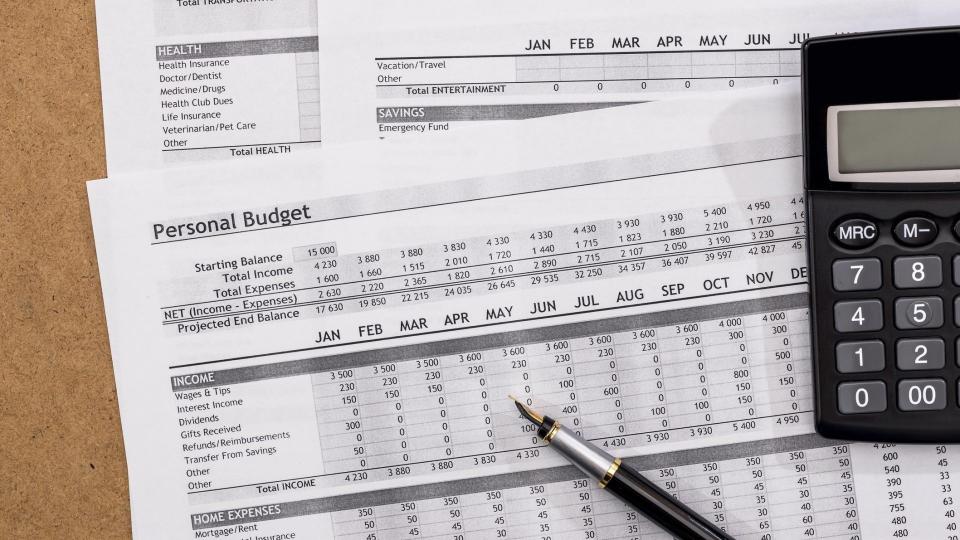How To Keep Your Financial Planning on Track in 2021

No matter how enthusiastic our New Year’s resolutions may have been to save more, spend less and/or take total ownership of our finances in 2021, we might now be losing our luster. The days since we made those ambitious resolutions are quickly passing and the shine is wearing off. Can’t we just cut ourselves some slack and do what makes us feel good and safe in the immediate sense, even if that means forsaking our lofty financial goals?
Read More: How To Set Realistic Financial Goals for 2021
The answer is: You can do whatever you want with your New Year’s resolutions, including trashing them. But before you do that, consider where you were coming from when you made those promises to yourself. Chances are, you were coming from a place of hope. You hoped to see an improved situation for yourself, and now, as the deadly winter drags on and the ruthless credit card statements roll in, that hope is dimming.
Related: America’s Top Money Resolutions for 2021 — and How To Make Them a Reality
Try, if you can muster the energy, to return to that place of desire for a better financial life. If you feel that you’ve already blown it by say, spending beyond your weekly budget or skipping a credit card payment, remember that just because you made a mistake, doesn’t mean you can’t try again and have success.
But don’t take it from me: Take it from the experts who’ve provided a road map to keep (or get) your financial planning on track in 2021.
Last updated: April 9, 2021

1. Examine 2020’s Spending
“The pandemic helped consumers reevaluate spending in terms of what they needed, versus what they wanted,” said Angela Holliday, president of Frost Brokerage Services, Inc. and Frost Investment Services, LLC. “With this in mind, take a look at how you managed to cut costs in 2020 and apply that where you can in 2021. Then, use the extra cash towards paying off your debt. This will help you continue good habits so you can prosper in the new year.”
Getting Ahead: A Month-by-Month Guide for Your 2021 Financial Check-Ins

2. Budget For Savings
“Warren Buffett is quoted as saying, ‘If you want to make saving a priority, take a look at how you budget. Do not save what is left after spending; instead, spend what is left after saving,’” said Dr. Robert R. Johnson, professor of finance, Heider College of Business, Creighton University. “If one truly wants to make savings a priority, it cannot be a residual — what is left over. It should be a line item on your budget. You don’t successfully build wealth by simply taking what you have left after all your expenses. We accomplish what we prioritize. Prioritize savings and invest those savings.”
Make a Comeback: How To Bounce Back Financially in 2021

3. Keep Your Goals Very Specific
“Writing down ‘I will save more’ isn’t tangible, and quite frankly, comes off more like a lofty wish than an actionable goal,” said Nishank Khanna, CFO of Clarify Capital. “Your goals should be specific. If you really want to save more, come up with a number and write that down. Whatever you write should be concrete and measurable. When you’re able to quantify your objectives, you’ll find it much easier to track progress and work towards goal achievement.”
Additionally, if you are able to write down your financial goals via pen and paper (as opposed to using a phone or computer), you should do so. Research has shown that the manual act of writing can enforce our memory, potentially helping us more easily recall our goals later.
Once your goals are written down, set dates in your planner to revisit them and check your progress. “Then remember those accountability dates by setting reminders on your phone and sending emails/texts to your future self,” said Shaun Morgan, personal finance blogger at Simply Know Money. Morgan also recommends printing out your goals and placing them in areas where you might stumble upon them without meaning to.
Make the Cut: The Top Expenses To Cut From Your Budget in 2021

4. Don’t Just Track Your Spending, Chart It
“Many people simply track their finances automatically with an app – which is a great start, but what these apps don’t account for is when you stray or get off-target with your financial goal, which happens a lot,” said Amanda L. Grossman, a certified financial education instructor and personal finance blogger at FrugalConfessions.com. “What you want to do is to start calculating and then tracking the gap between where you are, and where you should be, according to your financial plan or goal.”
What this means, Grossman explained, is “charting where you should be each week or month (or even daily) to achieve your financial goal, and then also charting (in a different color) where you actually are. The space between the two lines will be your ‘gap’, which can either mean you’re behind, or ahead, or ‘the curve’. The curve being the numbers you need to be hitting to hit your overall financial goal target.”
Dream Big: 18 Resolutions To Get Rich in 2021

5. Get a Separate (Online) Savings Account for Emergency Funds
“To help [prevent] overspending, I generally recommend having separate savings account beyond the primary checking and savings account at your primary bank,” said Todd Bryant, founding partner and financial planner at Signature Wealth Advisors, LLC. “Although rates dropped significantly on savings in 2020, take a look at online high-yield savings account for this secondary account. Use this not to replace your primary checking/savings, but to supplement as a place to keep your rainy day/emergency fund. By having it at a separate institution, it tricks your brain into thinking it’s harder to access that money and you might not as freely transfer money in and out like you would between accounts at separate banks. Plus, the online high-yield banks generally will pay much higher interest rates than the traditional brick & mortar.”
There’s Still Time: Start 2021 Off Right With Your January Financial Checklist

6. Revisit Your Subscription Services
2020 was the year of the subscription service. Maybe 2021 can be the year that you take it down a notch; after all, these things add up and those free trials tend to be woefully short.
“Many people sign up for monthly subscription services, [and] once they’re signed up, they rarely go back to reassess,” said Steffa Mantilla, a certified financial education instructor and founder of the personal finance site Money Tamer. “Make a list of all your subscriptions and critically assess whether you’re getting the full value out of them. Many people find that they have two or three services that offer the same type of service. By cutting even a few of these subscriptions, you’ll save hundreds of dollars every year.”
Keep Watching: Why Streaming Services Will Still Be Worth the Extra Expense in 2021

7. Invest Time in Learning About Money
“In our country today we require more formal education to drive a vehicle than we do to manage money,” said Harry N. Stout, author of the FinancialVerse, personal finance books and content. “People are just not prepared to address the financial matters they face in life. Study after study shows that Americans lose over $1,000 annually by not properly understanding basic household finance issues — that’s about the monthly mortgage payment on a modest home or over two average car loan payments. There is payback in improving financial literacy.”
“Financial literacy is defined as being educated about money and finance, with a special focus on an individual’s personal finances,” Stout continued. “Being financially literate enables smarter money management decisions to be made that lead directly to a financially secure future, one that protects the assets and loved ones. Categories that typically come into play with financial literacy are everyday financial issues like budgeting, spending, debt, taxes, retirement savings, college savings, mortgage management and tax and estate planning. If sufficient time is not spent learning about better managing money matters, individuals will not be able to reduce financial stress and anxiety. Knowledge is power.”
Read More: How Your 2021 Finances Will Look the Same (and Different) Compared to 2020

8. Take a Course on Debt
To continue where Stout left off, note that knowledge can also be free if you know where to look. Debt.com’s 12-month self-improvement email course #WeKnowDebt is free of charge. The course gives Americans “a comprehensive breakdown of basic personal finance topics [including] budgeting, savings, interest rates, taxes, and good credit – just to name a few,” said Howard Dvorkin, CPA and chairman of Debt.com. “The course also provides support through a Facebook group for those who sign-up and have questions along the way. Each email lesson in the #WeKnowDebt course is jargon-free and comes with a unique list of resources — along with a ‘Learn this’ and ‘Do this’ section. Anyone interested in making financial literacy a year-long goal can sign up for the free, #WeKnowDebt email course here.”
Read More: 11 Steps for Paying Off Credit Card Debt in 2021

9. Retain a CPA — and Consult With Them Regularly
“It’s one thing to have financial goals, but it’s another to have financial goals with no viable strategy in place to do meet said goals or track implementation of employed strategies,” said Jasmine Young founder, CEO, Southern Tax Preparation & Services. “A CPA can help you do both, but not if they only see you during tax time. CPAs perform relational work meaning that if they have formed a relationship with you and you are checking in with them several times throughout the year, they are abreast of events that have happened throughout the year that can affect your finances and better able to provide you with more guidance and advice as to how to reach the financial goals you set.”
Financial Advisor vs. Certified Financial Planner: What’s the Difference?

10. Change Your Goals as Life Changes You
Remember those super-specific goals we made you write down? Well, when you revisit them, be open to revising them. Try to pinpoint the “why” behind them. As we change, so do our wants and sometimes even our needs.
“You might be going down a track for one thing but now you have completely different goals,” said Tolen Teigen, chief investment officer of Financial Decisions. “Take a step back and think about what you want to accomplish. Many people have had a lot of major changes. Most flexibility from a leniency standpoint. Maybe now is the right time for a career change or moving out of state or elsewhere.”
Learn More: A Month-By-Month Guide to Expanding Your Savings Account in 2021

11. Let Go of Perfection
“The goal isn’t perfection, it’s progress; Celebrate the little wins,” said Melbourne O’Banion, co-founder and CEO of Bestow. “When it comes to managing your money, don’t make perfection the enemy of progress. Checking important items off your to-do list is an incredibly valuable part of meeting your money goals, such as finally buying that life insurance policy you’ve been putting off, setting up auto deposits into an IRA or brokerage account, or creating a will. Plus, that sense of accomplishment will motivate you to keep up the momentum and do more.”
More From GOBankingRates:
This article originally appeared on GOBankingRates.com: How To Keep Your Financial Planning on Track in 2021
